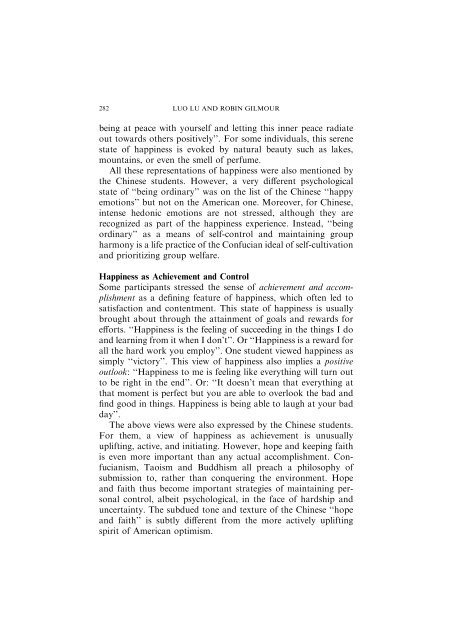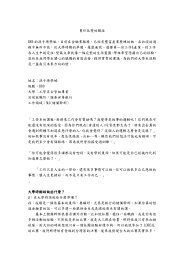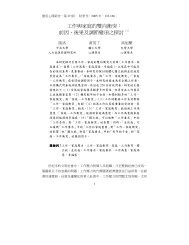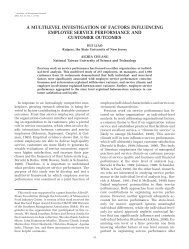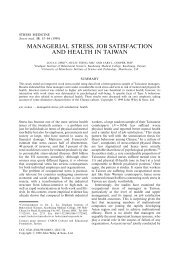CULTURE AND CONCEPTIONS OF HAPPINESS: INDIVIDUAL ...
CULTURE AND CONCEPTIONS OF HAPPINESS: INDIVIDUAL ...
CULTURE AND CONCEPTIONS OF HAPPINESS: INDIVIDUAL ...
Create successful ePaper yourself
Turn your PDF publications into a flip-book with our unique Google optimized e-Paper software.
282LUO LU <strong>AND</strong> ROBIN GILMOURbeing at peace with yourself and letting this inner peace radiateout towards others positively’’. For some individuals, this serenestate of happiness is evoked by natural beauty such as lakes,mountains, or even the smell of perfume.All these representations of happiness were also mentioned bythe Chinese students. However, a very different psychologicalstate of ‘‘being ordinary’’ was on the list of the Chinese ‘‘happyemotions’’ but not on the American one. Moreover, for Chinese,intense hedonic emotions are not stressed, although they arerecognized as part of the happiness experience. Instead, ‘‘beingordinary’’ as a means of self-control and maintaining groupharmony is a life practice of the Confucian ideal of self-cultivationand prioritizing group welfare.Happiness as Achievement and ControlSome participants stressed the sense of achievement and accomplishmentas a defining feature of happiness, which often led tosatisfaction and contentment. This state of happiness is usuallybrought about through the attainment of goals and rewards forefforts. ‘‘Happiness is the feeling of succeeding in the things I doand learning from it when I don’t’’. Or ‘‘Happiness is a reward forall the hard work you employ’’. One student viewed happiness assimply ‘‘victory’’. This view of happiness also implies a positiveoutlook: ‘‘Happiness to me is feeling like everything will turn outto be right in the end’’. Or: ‘‘It doesn’t mean that everything atthat moment is perfect but you are able to overlook the bad andfind good in things. Happiness is being able to laugh at your badday’’.The above views were also expressed by the Chinese students.For them, a view of happiness as achievement is unusuallyuplifting, active, and initiating. However, hope and keeping faithis even more important than any actual accomplishment. Confucianism,Taoism and Buddhism all preach a philosophy ofsubmission to, rather than conquering the environment. Hopeand faith thus become important strategies of maintaining personalcontrol, albeit psychological, in the face of hardship anduncertainty. The subdued tone and texture of the Chinese ‘‘hopeand faith’’ is subtly different from the more actively upliftingspirit of American optimism.


